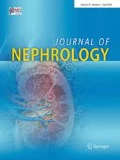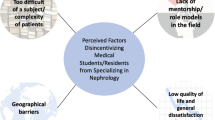Abstract
Background
There is global recognition that interest in nephrology among pediatric and adult trainees is waning, while the burden of kidney disease continues to wax. There is a growing need to engage trainees in nephrology education. The objective of this study was to systematically review the literature on nephrology education for medical students and residents published in the last six years, collate the findings, and extract major themes in order to better define the gaps in this field.
Methods
A systematic literature search was conducted on four major academic search engines including MEDLINE (OvidSP), ERIC, EMBASE and Web of Science until October 22, 2020, retrieving a total of 2,694 studies. Forty studies published after September 2014 met the inclusion and exclusion criteria. These studies were analyzed based on study focus, type of study design, and outcomes.
Results
The studies fell into three main areas of focus: (a) factors that influence interest in nephrology careers (b) current gaps in nephrology knowledge and (c) innovative educational strategies. Barriers to engaging learners in nephrology include a lack of exposure, lack of mentorship, and perceived complexity of nephrology. Baseline awareness is deficient in the management of chronic kidney disease and acute kidney injury. Applying active learning strategies may reduce the perceived barriers to understanding nephrology.
Conclusion
The importance of engaging the future nephrology workforce is well-recognized. Nephrologist educators should focus their efforts in studying curriculum interventions and their impact not only on learner satisfaction, but also future behavior, career choices, and patient outcomes.


Similar content being viewed by others
References
Sharif MU, Elsayed ME, Stack AG (2016) The global nephrology workforce: emerging threats and potential solutions! Clin Kidney J 9:11–22. https://doi.org/10.1093/ckj/sfv111
Weinstein AR, Reidy K, Norwood VF et al (2010) Factors influencing pediatric nephrology trainee entry into the workforce. Clin J Am Soc Nephrol 5:1770–1774. https://doi.org/10.2215/CJN.07071009
Nakhoul GN, Mehdi A, Taliercio JJ et al (2019) Residents’ perception of the nephrology specialty. Kidney Int Rep 5:94–99. https://doi.org/10.1016/j.ekir.2019.08.013
Roberts JK, Sparks MA, Lehrich RW (2016) Medical student attitudes toward kidney physiology and nephrology: a qualitative study. Ren Fail 38:1683–1693. https://doi.org/10.1080/0886022X.2016.1230459
Jhaveri KD, Sparks MA, Shah HH et al (2013) Why not nephrology? A survey of US internal medicine subspecialty fellows. Am J Kidney Dis 61:540–546. https://doi.org/10.1053/j.ajkd.2012.10.025
Williams SE (2018) Nephrophobia: teaching renal medicine to the undergraduate student. J Nephrol 31:793–794. https://doi.org/10.1007/s40620-018-0528-9
Jozefowicz RF (1994) Neurophobia: the fear of neurology among medical students. Arch Neurol 51:328–329. https://doi.org/10.1001/archneur.1994.00540160018003
Tonelli M, Wiebe N, Manns BJ et al (2018) Comparison of the complexity of patients seen by different medical subspecialists in a universal health care system. JAMA Netw open 1:e184852. https://doi.org/10.1001/jamanetworkopen.2018.4852
Kalloo SD, Mathew RO, Asif A (2016) Is nephrology specialty at risk? Kidney Int 90:31–33. https://doi.org/10.1016/j.kint.2016.01.032
Rangaswami J, Mathew RO, McCullough PA (2018) Resuscitation for the specialty of nephrology: is cardionephrology the answer? Kidney Int 93:25–26. https://doi.org/10.1016/j.kint.2017.10.002
Maursetter LJ, Stern LD, Sozio SM et al (2016) Enhancing nephrology career interest through the ASN kidney TREKS program. J Am Soc Nephrol 27:1604–1607. https://doi.org/10.1681/ASN.2015101086
Bayliss GP, Cobb J, Decker B et al (2019) Kidney mentoring and assessment program for students: a guide for engaging medical students in nephrology. Clin Kidney J 12:761–766. https://doi.org/10.1093/ckj/sfz108
Shah S (2019) Mentorship in the digital age: nephrology social media collective internship. Clin J Am Soc Nephrol 14:294–296. https://doi.org/10.2215/CJN.09970818
Colbert GB, Topf J, Jhaveri KD et al (2018) The social media revolution in nephrology education. Kidney Int Rep 3:519–529. https://doi.org/10.1016/j.ekir.2018.02.003
Kochhar KP (2007) Teaching physiology by poetry—an ode to nephros [3]. Indian J Physiol Pharmacol 51:421–422
Jhaveri KD, Perazella MA (2016) Nephrologists as educators: clarifying roles, seizing opportunities. Clin J Am Soc Nephrol 11:176–189. https://doi.org/10.2215/CJN.12151214
Bayefsky SD, Shah HH, Jhaveri KD (2016) Nephrology education for medical students: a narrative review. Ren Fail 38:1151–1159. https://doi.org/10.1080/0886022X.2016.1185352
Dixon A (2020) Medical student interest in pediatric nephrology: can an enjoyable lecture increase interest? Am J Kidney Dis 75:562. https://doi.org/10.1053/j.ajkd.2020.02.094
Elbaba M (2016) Using simulation to enhance the training in pediatric nephrology. Pediatr Nephrol 31:1907. https://doi.org/10.1007/s00467-016-3467-5
Reid Burks A, Nicklas D, Owens J et al (2016) Urinary tract infections: pediatric primary care curriculum podcast. MedEd Portal J Teach Learn Resour 12:10434. https://doi.org/10.15766/mep_2374-8265.10434
Corporation HM, College WCM (2017) Acute pediatric nephrology simulation. Pediatr Nephrol 32:1656. https://doi.org/10.1007/s00467-017-3753-x
Karangizi AHK, Chanouzas D, Mahdi A, Foggensteiner L (2019) How can we make renal medicine careers more appealing to UK trainees? Clin Kidney J 12:756–759. https://doi.org/10.1093/ckj/sfz002
Barat A, Goldacre MJ, Lambert TW (2018) Career choices for nephrology and factors influencing them: surveys of UK medical graduates. J R Soc Med Open 9:1–10. https://doi.org/10.1177/2054270418793024
Alebiosu CO, Oyebisi O, Adeyera O (2020) Sat-472 factors associated with choosing nephrology as a subspecialty by internal medicine residents in Nigeria. Kidney Int Rep 5:S197. https://doi.org/10.1016/j.ekir.2020.02.503
Sozio SM, Pivert KA, Shah HH et al (2019) Increasing medical student interest in nephrology. Am J Nephrol 50:4–10. https://doi.org/10.1159/000501058
Shah HH, Adams ND, Mattana J et al (2015) Nephrology elective experience during medical residency: a national survey of US nephrology fellowship training program directors. Ren Fail 37:999–1006. https://doi.org/10.3109/0886022X.2015.1055693
Nair D, Pivert KA, Baudy A, Thakar CV (2019) Perceptions of nephrology among medical students and internal medicine residents: a national survey among institutions with nephrology exposure. BMC Nephrol 20:146. https://doi.org/10.1186/s12882-019-1289-y
Beckwith H, Kingsbury M, Horsburgh J et al (2018) Why do people choose nephrology? Identifying positive motivators to aid recruitment and retention. Clin Kidney J 11:599–604. https://doi.org/10.1093/ckj/sfy076
Daniels MN, Maynard S, Porter I et al (2017) Career interest and perceptions of nephrology: a repeated cross-sectional survey of internal medicine residents. PLoS One 12:e0172167. https://doi.org/10.1371/journal.pone.0172167
Roberts JK, Hargett CW, Nagler A et al (2015) Exploring student preferences with a Q-sort: the development of an individualized renal physiology curriculum. Adv Physiol Educ 39:149–157. https://doi.org/10.1152/advan.00028.2015
Roberts JK, Chudgar SM, Engle D et al (2018) Digital chalk-talk videos improve knowledge and satisfaction in renal physiology. Adv Physiol Educ 42:146–151. https://doi.org/10.1152/advan.00131.2017
Faye M, Keita N, Ba B et al (2020) SAT-487 knowledge and practical attitudes of students at the end of the medical study cycle on screening for chronic kidney disease. Kidney Int Rep 5:S203–S204. https://doi.org/10.1016/j.ekir.2020.02.519
Akbar SR, Iqbal HI, Ahmed U (2015) The need to emphasize nephrology knowledge in residents-in-training. N Am J Med Sci 7:524–528. https://doi.org/10.4103/1947-2714.170621
Saad CY, Fogel J (2018) Awareness and knowledge among internal medicine resident trainees for dose adjustment of analgesics and neuropsychotropic medications in CKD. South Med J 111:155–162. https://doi.org/10.14423/SMJ.0000000000000781
Mills H, White W, Crisp R et al (2015) Developing a simulation-based training programme in renal emergency medicine for medical trainees. Nephrol Dial Trans. https://doi.org/10.1093/ndt/gfv190.24
Sims N, Dietiker K, Feig D et al (2014) A novel teaching mechanism in nephrology of the dangers of hypocalcemia in chronic renal failure. J Investig Med 62:533–534. https://afmr.org/files/Southern/2014/Southern_Regional_Meeting_Abstracts.pdf
Zakaria F, Wan Zukiman WZHH (2020) SAT-482 “U-R-ine” town board game: learning AKI the fun way!!! Kidney Int Rep 5:S201. https://doi.org/10.1016/j.ekir.2020.02.513
Renaud C, Siddiqui S, Jiexun W et al (2019) Faculty use of active learning in postgraduate nephrology education: a mixed-methods study. Kidney Med 1:115–123. https://doi.org/10.1016/j.xkme.2019.04.006
Dehghan A, Amini M, Sagheb MM et al (2017) Early clinical exposure program in learning renal physiology. J Adv Med Educ Prof 5:172–176
LeClair RJ, Binks AP (2019) Integrating acid-base and metabolic lab panels across systems in an M1 classroom activity. MedEd PORTAL J Teach Learn Resour 15:10793. https://doi.org/10.15766/mep_2374-8265.10793
Da J, Ran Y, Pi M et al (2018) Application of mini-clinical evaluation exercise for assessing the integrated-based learning during physical diagnostic course. Biochem Mol Biol Educ 46:417–423. https://doi.org/10.1002/bmb.21137
Giffen ZC, Carvalho H (2015) Development of a manipulative for nephron physiology education. Adv Physiol Educ 39:39–41. https://doi.org/10.1152/advan.00087.2013
Robinson PG, Newman D, Reitz CL et al (2018) A large drawing of a nephron for teaching medical students renal physiology, histology, and pharmacology. Adv Physiol Educ 42:192–199. https://doi.org/10.1152/advan.00022.2017
Bhaskar A, Oommen V (2018) A simple model for demonstrating the factors affecting glomerular filtration rate. Adv Physiol Educ 42:380–382. https://doi.org/10.1152/advan.00195.2017
Gomez AC, Warburton KM, Miller RK et al (2017) An interactive ambulatory nephrology curriculum for internal medicine interns: design, implementation, and participant feedback. Am J Kidney Dis 70:415–421. https://doi.org/10.1053/j.ajkd.2017.03.022
Bijol V, Byrne-Dugan CJ, Hoenig MP et al (2015) Medical student web-based formative assessment tool for renal pathology. Med Educ Online 20:26765. https://doi.org/10.3402/meo.v20.26765
Lawless ME, Mehri S, Henriksen J et al (2014) Modular education system improves pathology education in renal and genitourinary systems. Lab Investig 94:148A. https://doi.org/10.1038/labinvest.2014.20
Wall D (2010) Evaluation: improving practice, influencing policy. In: Swanwick T (ed) Understanding medical education: evidence, theory and practice. Wiley-Blackwell Publishing Ltd, West Sussex, pp 336–351
Cook DA, West CP (2013) Perspective: reconsidering the focus on “outcomes research” in medical education: a cautionary note. Acad Med 88:162–167. https://doi.org/10.1097/ACM.0b013e31827c3d78
Hoenig MP (2015) Share your passion for nephrology: ten tips to invigorate attending rounds and precepting sessions. Am J Kidney Dis 66:28–32. https://doi.org/10.1053/j.ajkd.2015.03.027
Raff AC (2020) Great nephrologists begin with great teachers: update on the nephrology curriculum. Curr Opin Nephrol Hypertens. https://doi.org/10.1097/MNH.0000000000000676
Melamed ML, Campbell KN, Nickolas TL (2017) Resizing nephrology training programs a call to action. Clin J Am Soc Nephrol 12:1718–1720. https://doi.org/10.2215/CJN.04740517
Bramstedt KA, Prang M, Dave S et al (2014) Telemedicine as an ethics teaching tool for medical students within the nephrology curriculum. Prog Trans 24:294–297. https://doi.org/10.7182/pit2014289
Pargeter K, Bhatt U (2014) Medical student assessment of technology utilization in nephrology education during preclinical years. Am J Kidney Dis 63:A88. https://doi.org/10.1053/j.ajkd.2014.01.296
Tena-Santana G, Gutierrez-Morales I, Navarro-Gilabert A et al (2014) A simulated practical scenario to teach students the pathophysiological manifestations of a renal insufficiency. Acta Physiol 212:21. https://doi.org/10.1111/apha.12387
Gonzales F III, Post M, Lee L (2015) Effective medical education resource design and integrative learning: a lesson in autosomal recessive polycystic kidney disease. FASEB J 29:691–2
Blakemore N, Bhandari S (2016) Increasing knowledge of acute kidney injury (AKI). Nephrol Dial Trans. https://doi.org/10.1093/ndt/gfw187.45
Phon E, Toru H, Nov T et al (2019) SAT-341 outcome of training courses to cambodian students and doctors in renal replacement therapy, nephrology, nutrition, diabetes, and clinical engineer supported by Japanese dialysis related societies. Kidney Int Rep 4:S151. https://doi.org/10.1016/j.ekir.2019.05.389
Solez K, Osaldor S (2020) SAT-481 nephrology immersion: a successful natural experiment. Kidney Int Rep 5:S201. https://doi.org/10.1016/j.ekir.2020.02.512
Acknowledgements
We thank Dr. Savithiri Ratnapalan, Professor, Department of Pediatrics and Dalla Lana School of Public Health, University of Toronto for her help with reviewing the protocol and critically reviewing the initial version of this manuscript.
Funding
No funding was received to assist with the preparation of this manuscript.
Author information
Authors and Affiliations
Contributions
CP had the idea for the article, CP, RC, AK and DN conceptualized the study and methodology. CP and SS performed the systematic literature search and data analysis. CP and DN drafted the original manuscript and RC, AK, and SS critically revised the work.
Corresponding author
Ethics declarations
Conflict of interest
The authors have no relevant financial or non-financial interests to disclose.
Compliance with Ethical Standards
The authors have no relevant financial or non-financial interests to disclose. Ethics approval was not required for this scoping review.
Additional information
Publisher's Note
Springer Nature remains neutral with regard to jurisdictional claims in published maps and institutional affiliations.
Supplementary Information
Below is the link to the electronic supplementary material.
Rights and permissions
About this article
Cite this article
Prasad, C., Sanger, S., Chanchlani, R. et al. Engaging medical students and residents in nephrology education: an updated scoping review. J Nephrol 35, 3–32 (2022). https://doi.org/10.1007/s40620-021-01135-6
Received:
Accepted:
Published:
Issue Date:
DOI: https://doi.org/10.1007/s40620-021-01135-6




